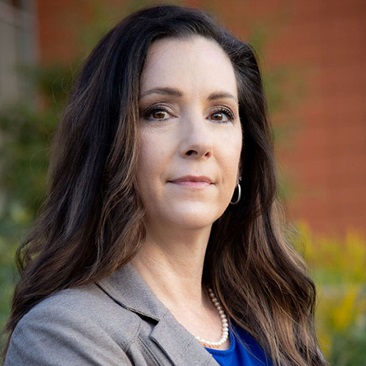Johanna Dunaway Named Research Director for the Institute for Democracy, Journalism and Citizenship
August 30, 2023
The political scientist and media scholar will engage colleagues and students in nonpartisan, evidence-based research to foster dialogue in the public’s interest.
Johanna Dunaway was among a trio of researchers who looked at voting patterns in communities of shuttered newspapers in 2018 and found evidence that the decline in local print media has contributed to political polarization in the United States.
Published in the Journal of Communication, their work caught the attention of a Florida daily newspaper, resulting in its decision to take a break from publishing national politics on its editorial pages. The aftermath of the paper’s decision created additional data for Dunaway and her counterparts to explore, ultimately fueling their co-authored book, “Home Style Opinion: How Local Newspapers Can Slow Polarization” (Cambridge University Press, 2021).
“The newspaper experiment we conducted in Palm Springs was fascinating,” says Dunaway, who was interviewed about her research for an episode of PBS Newshour that aired in early August. “Our findings added to the list of important societal consequences from declining local journalism. There is so much more research to be done on the democratic consequences emerging from changes in the digital media landscape; we need to better understand the effects of declining local news as well as how people get their information and decide what’s credible, and the impact on discourse and democracy more generally.”
This fall, Dunaway joins the Syracuse University Institute for Democracy, Journalism and Citizenship as the research director, a role that will empower her to expand on her work, guide student research and mentor the next generation of journalists and policy makers.
She will also serve as a tenured professor of political science, teaching courses in American politics, political communication, public opinion and mass media for the Maxwell School.
“Johanna Dunaway’s research and insights into the relationships between news, communications and political polarization is crucial to our work,” says Margaret Talev, veteran journalist and Kramer Director of the institute. “In addition to her scholarship, she shares in our commitment to the ideals of the institute. We’re excited for her to join us.”
Dunaway’s position is supported by a gift from alumna and Maxwell School Advisory Board Vice Chair Cathy L. Daicoff ’79 M.P.A. Her $1.2 million endowment last year established the Marguerite Fisher Faculty Research Fund, named for the Maxwell School’s first woman to have been promoted to full professor.
“I’ve no doubt that Johanna Dunaway will be an invaluable asset to Syracuse University, positioning the institute to be a leader in research that advances our understanding and promotes civil discourse and mutual understanding at this crucial time in our nation’s history,” says Daicoff, who retired as a managing director at Standard & Poor’s Ratings Services.
“There is so much more research to be done on the democratic consequences emerging from changes in the digital media landscape; we need to better understand the effects of declining local news as well as how people get their information and decide what’s credible, and the impact on discourse and democracy more generally.”
Johanna Dunaway
Research director of the Institute for Democracy, Journalism and Citizenship
Based in Washington, D.C., the institute is an initiative of the Maxwell School and the S.I. Newhouse School of Public Communications. It will promote nonpartisan, evidence-based research and dialogue in the public interest and support the work of faculty and students in the center of American democracy.
Dunaway earned a Ph.D. in political science from Rice University in 2006. Her research spans several subfields of political science—communication, public opinion, political psychology, and political behavior—as well as media effects, media institutions and emerging communications.
She joins Syracuse University from Texas A&M University’s Department of Political Science, where she was a professor. Her previous roles also include serving as the Joan Shorenstein Fellow at Harvard University’s Shorenstein Center for Media, Politics and Public Policy, and serving as an associate and assistant professor in Louisiana State University’s Department of Political Science and Manship School of Mass Communication. She began her academic teaching career on the faculty of Sam Houston State University’s Department of Political Science.
In addition to “Home Style Opinion” she is the co-author of “News and Democratic Citizens in a Mobile Era” (Oxford University Press, 2022) and a forthcoming book with Cambridge University Press, “The House that Fox News Built? Representation, Political Accountability, and the Rise of Partisan Cable News.” She also co-wrote the eleventh edition of a popular textbook for political communication courses, “Mass Media and American Politics.” (CQ Press, 2022) In addition to the Journal of Communication, her work has been published in the American Journal of Political Science, the Journal of Politics, the Journal of Computer-Mediated Communication, Political Communication, and Public Opinion Quarterly.
Dunaway’s awards include the shared 2019 Walter Lippmann Best Published Article Award from the American Political Science Association’s Political Communication Division and the shared 2018 Lynda Lee Kaid Best Published Article in Political Communication from the Association for Education in Journalism and Mass Communication’s Political Communication Division.
“Professor Dunaway’s research, teaching, extramural funding and public impact make her an excellent fit with the goals of the institute,” says Maxwell Dean David M. Van Slyke. “Her values align with the institute’s mission and are core to an educated and engaged citizenry which is necessary for a stronger and thriving democracy. I am excited by the leadership she’ll provide in partnership with institute Director Margaret Talev and the broader Syracuse University community.“
Dunaway says she is excited about launching research projects and partnering with news outlets, nonprofits and other organizations to “figure out what’s working and what isn’t; what’s reaching the audience; what’s adding to political rancor and various forms of partisan polarization.”
She hopes to further examine the decline of print media and explore financial models—some of her past work has focused on the impact of media ownership. She’s especially interested in gathering data to show the impact of declining local news and the rise of partisan and national news on the behavior of elected officials.
Dunaway also looks forward to having an opportunity to collaborate again with Josh P. Darr, one of two scholars she partnered with on the local newspaper and polarization project five years ago. Darr joins Newhouse this fall as an associate professor and will also hold a courtesy appointment in the Maxwell School Political Science Department and will serve as a senior research associate at the institute.
“I’m excited to build on our prior findings,” says Dunaway.
She adds, “If nothing else, sharp declines in public trust in the media and government institutions suggest an urgent need to understand the extent to which these changes are fueling political corruption and a general lack of political accountability. I’m excited to get to work.”
By Jessica Youngman
Published in the Fall 2023 issue of the Maxwell Perspective
Related News
School News

Dec 2, 2025
Commentary

Dec 1, 2025


